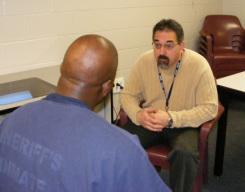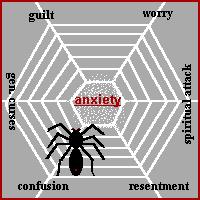Helping Addicts Who Are Mentally Ill
How can we help the addict who is also mentally ill?
A. Understanding “Dual Diagnosis” — Up to one-third of today’s homeless adults are mentally ill. The trend toward “deinstitutionalization” of the mentally ill has meant that our city streets are now being flooded with people  who at one time would have been hospitalized for their problems. As many as half of them are also addicted to alcohol and/or drugs. Many are “self-medicating” — using addictive substances to cope with their mental problems. Social service professionals usually do not like working with these “dually diagnosed” people because they can be so demanding and time-consuming. They can be too destructive and troubled for the typical addiction recovery program. And, mental health workers shy away from them because they often do not stay sober long enough for treatments to be effective. So, they end up at the rescue mission.
who at one time would have been hospitalized for their problems. As many as half of them are also addicted to alcohol and/or drugs. Many are “self-medicating” — using addictive substances to cope with their mental problems. Social service professionals usually do not like working with these “dually diagnosed” people because they can be so demanding and time-consuming. They can be too destructive and troubled for the typical addiction recovery program. And, mental health workers shy away from them because they often do not stay sober long enough for treatments to be effective. So, they end up at the rescue mission.
Helping Addicts Who Are Mentally Ill Read More »





 Alcohol dependence, sometimes referred to as alcoholism , is the most severe type of alcohol problem and is characterized by three of seven symptoms experienced during a one year time period. According to the Diagnostic and Statistical Manual of Mental Disorders, Fourth Edition, the symptoms of alcohol dependence include:
Alcohol dependence, sometimes referred to as alcoholism , is the most severe type of alcohol problem and is characterized by three of seven symptoms experienced during a one year time period. According to the Diagnostic and Statistical Manual of Mental Disorders, Fourth Edition, the symptoms of alcohol dependence include:
 I wrote to you not to associate with any one who bears the name of brother if he is guilty of immorality or greed, or is an idolater, reviler, drunkard, or robber—not even to eat with such a one. For what have I to do with judging outsiders? Is it not those inside the church whom you are to judge? God judges those outside. “Drive out the wicked person from among you.”
I wrote to you not to associate with any one who bears the name of brother if he is guilty of immorality or greed, or is an idolater, reviler, drunkard, or robber—not even to eat with such a one. For what have I to do with judging outsiders? Is it not those inside the church whom you are to judge? God judges those outside. “Drive out the wicked person from among you.”

 A Christian friend once told me, “Well, why even talk about feelings, because you can’t trust them anyway. The Bible says, Have faith and don’t trust your feelings.” Well, that’s not really a healthy attitude at all, because feelings are real. Denial is all of these repressed and stuffed emotions, and part of sobriety and getting better means that all of a sudden all of the pain that has been pushed down. And anger, and everything else that has been there, is going to start rising to the surface, and these people will start feeling depression and loneliness and fear. And we need to be prepared to hear those things and to respond to them in a supportive, kind way. It doesn’t mean that — and some of those feelings are not accurate at all, but still need to be respected and accepted. It has to be there.
A Christian friend once told me, “Well, why even talk about feelings, because you can’t trust them anyway. The Bible says, Have faith and don’t trust your feelings.” Well, that’s not really a healthy attitude at all, because feelings are real. Denial is all of these repressed and stuffed emotions, and part of sobriety and getting better means that all of a sudden all of the pain that has been pushed down. And anger, and everything else that has been there, is going to start rising to the surface, and these people will start feeling depression and loneliness and fear. And we need to be prepared to hear those things and to respond to them in a supportive, kind way. It doesn’t mean that — and some of those feelings are not accurate at all, but still need to be respected and accepted. It has to be there.